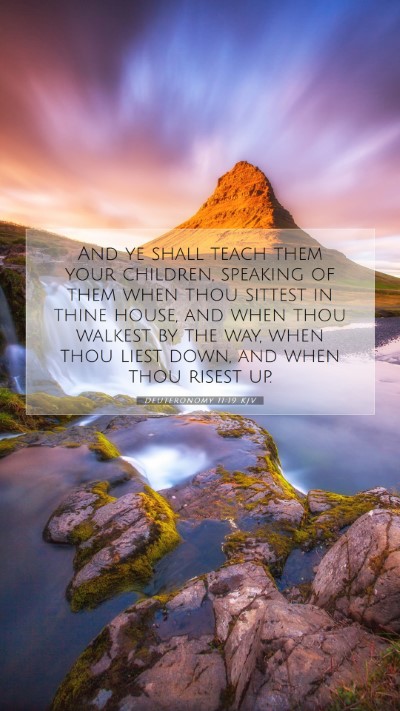Old Testament
Genesis Exodus Leviticus Numbers Deuteronomy Joshua Judges Ruth 1 Samuel 2 Samuel 1 Kings 2 Kings 1 Chronicles 2 Chronicles Ezra Nehemiah Esther Job Psalms Proverbs Ecclesiastes Song of Solomon Isaiah Jeremiah Lamentations Ezekiel Daniel Hosea Joel Amos Obadiah Jonah Micah Nahum Habakkuk Zephaniah Haggai Zechariah MalachiChapter
Deuteronomy 1 Deuteronomy 2 Deuteronomy 3 Deuteronomy 4 Deuteronomy 5 Deuteronomy 6 Deuteronomy 7 Deuteronomy 8 Deuteronomy 9 Deuteronomy 10 Deuteronomy 11 Deuteronomy 12 Deuteronomy 13 Deuteronomy 14 Deuteronomy 15 Deuteronomy 16 Deuteronomy 17 Deuteronomy 18 Deuteronomy 19 Deuteronomy 20 Deuteronomy 21 Deuteronomy 22 Deuteronomy 23 Deuteronomy 24 Deuteronomy 25 Deuteronomy 26 Deuteronomy 27 Deuteronomy 28 Deuteronomy 29 Deuteronomy 30 Deuteronomy 31 Deuteronomy 32 Deuteronomy 33 Deuteronomy 34Verse
Deuteronomy 11:1 Deuteronomy 11:2 Deuteronomy 11:3 Deuteronomy 11:4 Deuteronomy 11:5 Deuteronomy 11:6 Deuteronomy 11:7 Deuteronomy 11:8 Deuteronomy 11:9 Deuteronomy 11:10 Deuteronomy 11:11 Deuteronomy 11:12 Deuteronomy 11:13 Deuteronomy 11:14 Deuteronomy 11:15 Deuteronomy 11:16 Deuteronomy 11:17 Deuteronomy 11:18 Deuteronomy 11:19 Deuteronomy 11:20 Deuteronomy 11:21 Deuteronomy 11:22 Deuteronomy 11:23 Deuteronomy 11:24 Deuteronomy 11:25 Deuteronomy 11:26 Deuteronomy 11:27 Deuteronomy 11:28 Deuteronomy 11:29 Deuteronomy 11:30 Deuteronomy 11:31 Deuteronomy 11:32


Understanding Deuteronomy 11:19
Verse: "And ye shall teach them your children, speaking of them when thou sittest in thine house, and when thou walkest by the way, when thou liest down, and when thou risest up."
Deuteronomy 11:19 emphasizes the importance of imparting God's commandments to the next generation. This verse highlights the role of parents in educating their children about God's laws and the significance of regular, everyday discussions about Scripture. Let's explore the meaning of this verse as provided by various commentators.
Insights from Public Domain Commentaries
Matthew Henry's Commentary
Matthew Henry asserts that this verse underscores the necessity of teaching children about God's commandments consistently. He notes that teaching should not be limited to formal settings but should occur naturally in everyday life. Children should be instructed during routine activities such as meals and travel, ensuring that God’s word becomes an integral part of family life.
Albert Barnes' Commentary
Albert Barnes interprets this verse as a mandate for constant vigilance in nurturing a relationship with God within the family structure. He emphasizes that this instruction not only serves as a means of religious education but also cultivates a lasting spiritual legacy. The manner in which parents discuss God's word should be organic, taking place during routine conversations and activities.
Adam Clarke's Commentary
Adam Clarke elaborates on the various contexts mentioned in the verse. He points out that the act of teaching should occur at pivotal moments: when one is seated at home, traveling, resting, or waking up. This approach demonstrates that the teachings of God should permeate all aspects of daily life, creating a holistic environment for spiritual growth and understanding.
Key Themes in Deuteronomy 11:19
The key themes illustrated in this verse include:
Application of Scripture
How can we apply Deuteronomy 11:19 to our lives? This verse indicates that we can incorporate discussions about God's word in our daily routines.
Families can engage in Bible study lessons at home, creating an environment where Scripture is actively discussed and lived out. This approach can also enhance Bible study groups, as families collaborate and share insights with others.
Cross References
This verse correlates with the following scriptures, enhancing our understanding:
Conclusion
Understanding Deuteronomy 11:19 reveals the significance of parental guidance in spiritual matters. It's a reminder of the vital role of families in nurturing faith and how daily life can serve as a canvas for teaching Biblical principles. By consistently engaging in these discussions, we fulfill the call to make God's word a central part of our lives and the lives of our children.